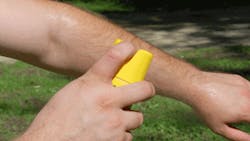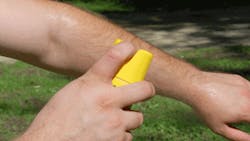Could Insect Repellents Hurt You and Your Family? The FDA Says Yes!
Pow! You feel the familiar and unpleasant bite of a mosquito. Your body, startled into beast mode, moves in ways that defy the laws of physics as you launch counter attacks against the formidable little foe. But the mosquito calls in reinforcements and together they swarm, each jockeying for the next opportunity, the next vulnerable victim.
There too, is baby brother and big sister, one crying from a bite, the other meticulously counting the welts marking the war wounds for the day. And there’s your spouse, looking at you to do something!
Your family is under attack. You see an opportunity for preemptive strike, a trusted protective shield … the insect repellent. A mist fills the air as the aromatic droplets land on you and your family’s clothing, skin and, if you’re not careful, their lungs. Your wrath is unleashed upon the invaders and finally, peace again reigns supreme.
But are the insect bites the only war wound? Perhaps not! The U.S. Food and Drug Administration (FDA) recently released its report, “Insect Repellent Use and Safety in Children - Don’t Swat Away Insect Repellent Directions,” which offers warnings about the use and re-application of insect repellents:
- Read the label. No hazard is reportedly present if you strictly follow the instructions.
- If a DEET (N,N-diethyl-m-toluamide) insect repellent also contains a sunscreen, do not reapply; repeated applications can increase toxic effects.
- Use only products that list EPA-registered ingredients.
- Use of insect repellents containing DEET on children under 2 months of age is a no-go; the same is true for the use of oil of lemon eucalyptus on children under the age of 3.
- After the outside activities, wash the treated skin and clothes.
- Concentrations of active ingredients above 50 percent generally do not increase protection.
- Concentrations below 10 percent generally do not offer sustained protection.
EPA offers additional safety guidelines:
- Do not use repellents under clothing.
- Store insect repellents out of reach of children.
- Keep away from eyes, mouth, nose, irritated skin, cuts or wounds, food and enclosed areas.
- Forget about using insect repellents on Fido unless the label clearly states it is for animals.
According to the National Pesticide Information Center (NIPC), the absorption of DEET into the body is likely increased when applied with alcohol, when consuming alcohol or when using sunscreen products that contain DEET.
Plan ahead, use insect repellents according to their label and protect yourself and your family – because sometimes, the bark can be worse than the bite.
References:
- http://www.fda.gov/Drugs/EmergencyPreparedness/ucm085277.htm
- http://www.cdc.gov/ncidod/dvbid/westnile/qa/insect_repellent.htm
- http://www.cdc.gov/ncidod/dvbid/westnile/RepellentUpdates.htm
- http://www.epa.gov/pesticides/insect/safe.htm
- http://npic.orst.edu/factsheets/DEETgen.pdf
J.A. Rodriguez Jr., CEO of Make My Day Strategies LLC, is also an international Fortune 100 EHS senior manager, entrepreneur, a patented inventor, engineer, certified safety professional, professional speaker, member of the Industry Advisory Council at Western New England University, an elected Board Member of the national Voluntary Protection Program Participants’ Association, author of the book Not Intuitively Obvious – Transition to the Professional Work Environment, and an overall great guy.
About the Author
J. A. Rodriguez
J.A. Rodriguez Jr., CSP
J.A. Rodriguez Jr., CSP, ASP, is a Director on the Strategic Advisement Team at the Board of Certified Safety Professionals and the CEO of Make My Day Strategies LLC. He has led record-breaking and award-winning EHS teams while supporting $7B annually in business across 100+ countries. Rodriguez was honored to be selected by EHS Today as one of "The 50 People Who Most Influenced EHS in 2012-2013" and "2014 - 2015.” He also is an empowering and international keynote speaker, entrepreneur, a patented inventor, an engineer, a certified safety professional, author of the book "Not Intuitively Obvious – Transition to the Professional Work Environment" and co-editor of the American Society of Safety Engineers’ book “Consultants Business Development Guide.” Dare to think differently.

